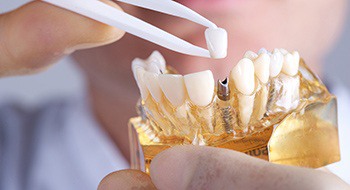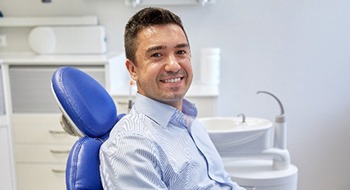Dental Implants – Daytona Beach, FL
Regain a Brilliant and Complete Smile
Why Choose Indigo Dental For Dental Implants?
- Flexible Payment Options Available
- Partnered with Local Dental Implant Experts
- State-of-the-Art Dental Technology Used
What Are Dental Implants?

A dental implant is a small titanium cylinder that is placed beneath the gumline in a minimally invasive surgery. Following the placement procedure, the implant forms a bond with the bone tissue around it, enabling it to act as a substitute for the root of a missing tooth. Once you’ve had a few months to heal from the placement surgery, our team will place a custom dental crown on top of the implant to replace the visible portion of the missing tooth. Dental implants can even be placed at certain angles and in strategic locations to support a dental bridge or a full or partial denture, bringing back several missing teeth at once.
As the only tooth replacement option that restores the hidden root of a tooth as well as its crown, dental implants are widely considered the best solution to tooth loss currently available.
4 Step Dental Implant Process
Getting dental implants is a commitment that lasts several months. Dr. Lloyd works with local dental implant specialists, so there will be an expert to explain things to you every step of the way. Each stage of the process is necessary to ensuring that you receive a beautiful, long-lasting new smile. The four main steps include the initial consultation, the implant surgery, osseointegration, and the final restoration. The procedure might look slightly different depending on your needs.
Initial Dental Implant Consultation

When you come to our office to ask about dental implants, Dr. Lloyd will evaluate your oral health and go over your medical history. We’ll need to take X-rays of your mouth and check for signs of bone loss and gum disease; these conditions must be treated before moving on with the dental implant process. Naturally, this is also the point where we determine how many dental implant posts are needed to restore your grin. Once we’ve figured out what your smile needs, we can go over the timeline and explain the overall costs to you so that you can start preparing now.
Dental Implant Surgery

By entrusting the implant surgery to a local specialist, we increase our patients’ chances of success and minimize the risk of complications arising during the treatment. When the procedure begins, the mouth is numbed, and sedation is administered if needed. Small incisions are made in the gums to provide access to the jawbone. The implants will be placed in predetermined areas where they’ll provide the best possible support for a dental restoration without unnecessarily damaging existing oral structures. After the gums are closed so that they can heal, protective caps are placed on top of the implant posts.
Dental Implant Osseointegration & Abutment

Dental implants don’t just sit in your jaw; they fuse with the bone, essentially becoming part of it. This is called osseointegration, and it’s what allows implants to fulfil the same functions as natural teeth. It can take several months for osseointegration to finish. Once it does, a small piece called an abutment will be attached to the implant post. This will require another minor surgery that will take a few weeks to recover from. Since the final restoration will be attached to the abutment, we have to wait until it’s in place before we can take the necessary impressions.
Delivery of Dental Restoration(s)

You’ll come back to our office to get your permanent crown, bridge, or denture for your implants. Different levels of tooth loss require different restorations. No matter which kind you get, we’ll double-check to make sure that it fits properly in your mouth and that it blends in with the rest of your teeth naturally. We’ll also take the time to make sure that your new bite is comfortable before letting you leave with your fully restored smile. Afterwards, we can examine your implants during your regular six-month checkups to make sure they don’t fail.
Benefits of Dental Implants

When you’re considering your options in tooth replacement, you should know that dental implants take time — as much as a year to complete. But they’re well worth the months spent! There is absolutely no better method of replacing one, several, or an entire arch of missing teeth. That’s because of the following benefits:
Day-to-Day Benefits

- Self-confidence is restored with the ability to eat all your favorite foods, even tough and crunchy foods that a denture would struggle to break down.
- When you’re missing teeth, it’s surprising how often you can rely on them to make certain sounds. When speaking with others, you can feel confident knowing your dental implant won’t be a burden as it mimics your previous tooth’s position exactly.
- Whether it’s time to flash your smile off for an impromptu photo op or express yourself to friends, family, or that special someone, no one will be able to tell you even had the implant placed! That’s largely thanks to the ceramic materials custom-shaded to your neighboring teeth, ensuring they blend in.
Health Benefits

- Dental implants prevent damage to enamel by restoring the root structures of teeth, making your implant restoration completely self-supporting. This protects remaining teeth and other oral structures. Unfortunately, this cannot be said for crowns or bridges, both of which require the removal of existing enamel just to be placed effectively.
- The more foods you’re able to eat, the easier it becomes to get the nutrients you need throughout the day. It means crunchy foods like nuts and vegetables are never a problem. Of course, indulging in a large cut of meat is also incredibly straightforward due to the improved biting force dental implants provide.
- Dental implants do not require any special maintenance to keep healthy. As long as you brush twice a day, floss daily, and visit our office for regular checkups, you can have confidence in your long-term oral health.
Long-Term Benefits

- The moment a tooth is lost, the jaw’s existing structure begins to break down, putting you at higher risk of future tooth loss. Dental implants maintain jawbone density and healthy gum tissue volume, promoting better overall oral health and providing the foundation existing teeth need to thrive.
- Teeth supported by dental implants fit properly for years to come. Traditional dental restorations need to be replaced every five to ten years, but implant prosthetics have a 90 to 95% success rate after 20 years. With proper care, you may even be able to keep the same implant restoration for the rest of your life.
- Dentures and bridges don’t replace the root, which blood flow to the cheeks is greatly hindered. This results in your facial tissue sagging and your cheeks hollowing out, making you look older than you actually are. Dental implants allow proper blood flow to occur to the gums, which helps your facial tissue maintain its natural elasticity.
Who Dental Implants Can Help
There are multiple options available for restoring your newly placed dental implants, and our recommendation will depend on the number of teeth/implants that require coverage. The fact of the matter is dental implants can be used to replace individual teeth or an entire arch with relative ease. This makes dental implants the most versatile tooth replacement option available today. Take a look below to learn if you’re a likely candidate for treatment and how replacing teeth works!
Who is a Good Candidate for Dental Implants?

More people are eligible to receive dental implants than ever before, but that doesn’t mean there aren’t certain factors that come into play when determining eligibility. For example, you should have good oral health, decent overall health, and enough healthy bone tissue to receive a dental implant. Thankfully, poor oral health or low bone density can both be addressed if needed in order to help you become eligible for dental implant treatment.
Missing One Tooth
Implant dental crowns are high in quality and designed to cover a single implant post. An abutment connects the two components together to achieve long-term stability. After the implant is placed into the jaw, it is given plenty of time to integrate so it can hold its future restoration without concern. The restoration will be made from lifelike materials, ensuring only you and our office know you had a dental implant placed.
Missing Multiple Teeth
Implant dental bridges will cover the gap left by consecutive missing teeth, and they are anchored on either side of the gap by a well-placed implant post. For both consecutive and non-consecutive teeth, an implant partial denture can be attached to two to four implant posts. Implant treatment does not require removal of enamel because the implants themselves can hold restorations without relying on neighboring teeth in the process.
Missing All Teeth
Implant dentures are designed to cover four to six implants to replace a full row of teeth, and they can be fixed or removable, depending on your personal preference. This type of denture does not slip or shift out of place while in use, making it an extremely comfortable, practical, and long-lasting option for replacing an entire arch of teeth at a time. Additionally, there’s no reason you can’t replace both your top and bottom arch with implant dentures.
In addition to a traditional implant prosthetic, Dr. Lloyd is also proud to offer All-on-4 dentures as a revolutionary way to upgrade your removable denture! Like the name implies, All-on-4 dentures rely on the placement of just four implants as a sturdy foundation for a lifelike appliance that will feel and function just like the smile you lost. After enough planning has been performed, you can have this procedure completed in a single appointment! It essentially means you can walk into our office with an incomplete smile and leave our office with an entirely transformed appearance.
Learn More About All-on-4 Learn More About Implant DenturesUnderstanding the Cost of Dental Implants

The cost of dental implants reflects the quality you can expect from your new smile. You will pay more than you would for dentures or a bridge, but your implant-retained restorations will last longer, let you enjoy more foods, and make it easier to laugh and smile without worrying about your teeth slipping out of place. Talk to our team members about what we can do to help you keep the cost of implant surgery down. Below, you’ll find a brief outline of what can affect the price of dental implants and how you can pay for them more easily.
Preliminary Treatments & Dental Implant Surgery

Getting dental implants is a process, and each stage carries its own costs. If you need gum disease therapy, tooth extractions, bone grafting, or another procedure, you’ll have to pay for it separately. Such procedures can add to the cost, but they can mean the difference between success and failure for your new smile.
When planning the surgery, the location of the implants and the type of sedation needed must be considered in order to accurately estimate the cost. We are partnered with trustworthy dental implant experts, who will discuss with you the amount you can expect to pay for the surgery itself.
The Parts of Your Dental Implant

When looking at the dental implant as a whole, you’ll find that there are many aspects to consider when figuring out the final price.
- The more implants you need, the higher the final cost will be. For this reason, when all of your teeth are missing, it’s better to get 4 to 6 implants to support a denture rather than a separate post for each tooth.
- Smaller restorations such as crowns cost less than larger restorations like bridges and dentures.
- Some implants are made out of zirconia instead of titanium, and the amount you pay will reflect that.
- The brand of dental implant used matters, as different manufacturers accommodate to the needs of different patients. Ask us more about brand-specific benefits.
How Dental Implants Can Save Money?

How can dental implant surgery ultimately end up being your most cost-effective solution? For one thing, you only need to pay for dental implants once; their long lifespan ensures that they don’t need to be replaced as often as traditional restorations. Also, if you’re getting implant dentures, then you’ll avoid the need for cleaning solutions, adhesives, special pastes, or other products normally required to take care of false teeth. Finally, dental implants help maintain a healthy jawbone, which lowers the risk of various oral health issues.
Does My Dental Insurance Cover Dental Implants?

Most of the time your insurance won’t pay for the implant posts themselves, but you should always check your coverage just in case. If there are any benefits you’re entitled to, we’ll make sure you get the most out of them. A percentage of related treatments, such as the final restoration or preliminary gum disease therapy, is often covered under dental insurance.
Making Dental Implants Affordable

For the parts of your treatment that you need to pay out of pocket, we can help you find solutions for making payments easier, such as applying for third-party financing via CareCredit. We’ll be sure to go over your options at the very beginning of the treatment so that you can be confident about staying in your budget.
Dental Implant Post-Op

It’s important after your dental implant surgery that you understand how to take care of your new smile during recovery. Successful healing is imperative if you want to be sure that your implants and customized restoration remain firmly in place. Fortunately, our team at Indigo Dental is here to offer detailed dental implant post-op instructions in Daytona Beach as well as helpful tips to make sure you heal fully and quickly. If at any point during your recovery you begin to experience problems of any kind, make sure to call our office as soon as possible.
What to Do Directly After Dental Implant Surgery

The key piece of advice you should follow after your dental implant surgery is to avoid dislodging your blood clot. It is necessary that it forms to help with the healing process. To do this, however, you will need to follow a few simple rules, including:
- Not using a straw to sip beverages.
- Do not smoke or use tobacco products for at least 24 hours (It’s better if you quit before receiving dental implants altogether).
- Don’t poke or prod at your surgical sites with your finger or tongue.
- Avoid spitting at all. Instead, make sure you have plenty of tissues or napkins you can use.
Common Side-Effects

It is not uncommon to experience certain side effects after your dental implant surgery. Although it might be a bit unsettling, you do not need to worry if you develop any of the following in the first few days:
- Intermittent bleeding – This can continue for a few days but can be remedied using gauze and gentle pressure.
- Mild discomfort – Over-the-counter pain reliever can help to alleviate any soreness or discomfort.
- Swelling – Potentially lasting 72 hours or one week, you can use a cold compress to reduce swelling and pain.
Diet

Soft foods will be your go-to source of nutrition after receiving your dental implants in Daytona Beach. You’ll need to make sure that you avoid unhealthy options or any items that are hard or crunchy. Some ideal food options to consider include:
- Pasta
- Scrambled eggs
- Yogurt or ice cream
- Pudding
- Soup (warm, not hot)
- Mashed potatoes
After a week or so, you can begin to incorporate other foods into your daily diet, but ultimately, it is up to you and how you are feeling.
Health & Oral Hygiene

Proper oral hygiene is imperative after oral surgery. Your implant dentist in Daytona Beach will explain how to approach your brushing, flossing, and rinsing habits once your titanium posts are firmly in place. To avoid the possibility of an infection, it is best if you:
- Wait 24 hours before brushing your teeth. You’ll need to be extra gentle and careful when brushing near your surgical sites.
- Avoid rinsing with mouthwash that contains alcohol or peroxide.
- Rinse 2-3 times each day with mild salt water or a prescription mouthwash to flush out toxins. Just be mindful not to spit or rinse too vigorously.
What to Do After Your New Teeth Are Attached

After months of recovery, you’ll finally receive your customized restoration. While it is possible to experience some mild soreness or discomfort once your crown, bridge, or denture is in place, it’s best to keep over-the-counter pain medication nearby, as your gums may feel a bit sore. The good news is that you should not experience any swelling or bleeding once your new teeth are secured in place.
Maintaining & Caring For Your Dental Implants

Did you know that patients who have their dental implants put into place by a skilled professional can expect a 98% success rate? After 10 years, the rate only falls to 90-95%! But if you want to make sure you’re one of the many who enjoy your prosthetics for a lifetime, it will be up to you to make sure they are properly maintained. At Indigo Dental, our team will provide you with the necessary instructions to ensure appropriate dental implant care in Daytona Beach. From learning which foods to eat to breaking bad habits and keeping up with your regularly scheduled dental checkups and cleanings, we’re here to make sure you know what to do to keep your implants looking and feeling their best.
Making Oral Hygiene a Priority

Although it is impossible for dental implants in Daytona Beach to decay, your natural, healthy teeth can, which is why you need to make sure you’re brushing, flossing, and rinsing regularly. Gum disease can be a problem no matter if you have implants or not, and it can attack the soft oral tissues, teeth, and bone, which can ultimately cause your implants to fail. By sticking to a regular dental hygiene routine, you can safeguard your smile and minimize your risk for many of the most common oral health problems.
Eating a Healthy Diet

Eating too many sweets and carbohydrates is not good for your overall health and wellbeing. They’re also a magnet for tooth decay and gum disease, so if you want to keep from putting your dental implants at risk, it’s best that you adopt a healthy, nutritious diet that consists of foods high in Vitamin C, leafy greens, lean proteins, dairy, fruits, and vegetables. Yes, your implants will allow you to eat foods that dentures will not, but you’ll need to be mindful in selecting healthier options to ensure the lifespan of your smile.
Breaking Bad Habits

Are you prone to biting your nails when you’re nervous? Do you smoke or use tobacco? Is eating ice a mindless habit you do while watching TV? If you said “yes” to any of these, it’s time to make a change. These bad habits can cause significant damage to your dental implants, resulting in additional time and money being spent to try and fix your smile. When choosing implants to replace your missing teeth, you made an expensive investment in the future of your oral and overall health. Make the most of it by giving up these poor habits and enjoying a happier, more beautiful appearance.
Protecting our Dental Implants

Do you enjoy playing sports? Maybe you recently discovered a newfound love for volleyball? Or maybe you’ve discovered your teeth look worn down because you grind them throughout the night? No matter the reason, it’s best to protect your dental implants with the help of a customized mouthguard. A dentist can provide you with a device that fits comfortably in your mouth and offers the maximum level of protection should you experience a stressful day at work or wish to hit the volleyball court over the weekend.
Scheduling Regular Dental Checkups

Your implant dentist in Daytona Beach doesn’t just say “so long” once your new teeth are firmly attached. Instead, you’ll need to maintain regular six-month dental checkups and cleanings to make sure that your natural, healthy teeth as well as your prosthetics and restorations are in tip-top shape. A trusted professional can quickly and easily identify problem areas early on as long as you stick to your regular schedule. These visits will not only ensure the lifespan of your natural teeth, but they’ll also make it possible for your dentist to pinpoint any slight damages or issues that may be associated with your dental implants.
Dental Implant Failure & Salvage

Did you know that with the help of a trusted implant dentist, your dental implants have a high success rate of 95% upon initial placement? This rate remains the same even after 10 years as long as you take proper care of your smile. However, as with any type of oral surgery, there is a rare chance that dental implant failure can occur. Should you notice some discomfort or believe your dental implants may be at risk, never hesitate to contact our office. The sooner we can examine your problem area, the greater our chances of restoring your smile with dental implant salvage treatment.
Dental Implant FAQs

Rebuilding your smile with dental implants is a big decision, so it’s normal to have questions that need answering before you’re ready to commit to a treatment plan. During your consultation, we’ll walk you through step-by-step of the process and will be happy to address your concerns. In the meantime, here are the answer to some of the dental implant questions we get asked most often.
Does Getting Dental Implants Hurt?
Some people hesitate to get dental implants in Daytona Beach because they don’t want to deal with post-operative pain. However, there is really nothing for you to worry about. You might experience some swelling after your surgery, but your discomfort should be minimal. Many patients have remarked that the entire process of getting dental implants was much easier than they anticipated. If you do end up in pain, though, your dentist may be able to give you medication or advice to remedy the problem.
Can I Still Get Dental Implants If I Smoke?
Tobacco use increases the risk of complications during and after your implant surgery. However, that doesn’t mean that you are barred from enjoying all the benefits of this treatment. Your oral surgeon will be sure to sit down with you and discuss how your smoking habit may affect your road to a restored smile.
Can Dental Implants Fail?
The vast majority of dental implant cases are successful. On rare occasions, however, something goes wrong and the implants must be removed. This may occur because of an infection in the bone that weakens the jaw to the point where it can no longer support the implants. In other cases, a medical condition that compromises the body’s ability to heal stops the implants from bonding with the body.
If implants are going to fail, they usually do so within the first year after they’re placed. If failure occurs after that, it might be because the person with the implant had poor habits that lead to an infection.
How Do I Take Care of My Dental Implants?
Your dentist will give you specific instructions on how to care for your mouth immediately after your implant surgery. You may need to stick to soft foods for a while and be very careful when you’re cleaning around the implant site.
After you heal and the restorations on top of the implants are in place, you can resume a normal routine of brushing and flossing. You’ll be able to treat your implants as if they were your natural teeth.
How Successful Are Dental Implants?
You can rest easy; dental implants are quite successful. They almost always work when placed by a skilled dentist. In fact, their success rate after ten years is over 95%!
That said, implants do require daily care. Whether they succeed will partly depend on your lifestyle. As such, always eat a mouth-healthy diet and practice good oral hygiene. You'd also be wise to get regular dental checkups.
At the same time, note your implant's location. Where this "tooth" sits in your mouth will affect its success. After all, the back teeth receive more strain from chewing. Implants that replace these chompers are slightly more likely to fail.
Do Dental Implants Decay?
Luckily, no – dental implants can't (and won't) decay. They don't have enamel like natural teeth do. So, cavities can't develop on them.
Of course, do keep caring for your smile. Your remaining teeth could still get cavities. Plus, gums can become infected. Such things mean your best move is to practice good oral hygiene. You'll save yourself time, money, and other hassles that way.
Will People Be Able to Tell That I Have Dental Implants?
Whether it's friends or family, most won’t notice that you have dental implants. The restorations blend seamlessly with your smile. Given that fact, they won't stand out from the rest of your teeth.
Remember, implants are specially made for your mouth. Dr. Lloyd will take dental impressions that help customize them. Therefore, the treatment results will match your other teeth' color, shape, and size.
At the same time, note that implants are secure. They're set in your jaw like tooth roots. In other words, you won't have to hold your jaw strangely to keep them steady. Your mouth should seem as normal as ever.
Do Dental Implants Feel Natural?
As a matter of fact, yes – dental implants feel pretty natural. They'll seem quite familiar once placed in your jawbone. In particular, they should feel like the roots of your natural teeth.
For starters, implants are capped with dental crowns. Their surfaces thus use dental porcelain. This material is smooth and toothlike, so it won't feel rough against your tongue. You might even forget that the implants are there!
Furthermore, implants themselves have no nerve endings. You can't really sense anything from them at all. Instead, anything you feel will come from the surrounding gums. That includes sensations of heat, cold, pressure, etc.
Can I Take My Dental Implants Out?
Many patients in Daytona Beach wonder whether dental implants function like dentures, which are intended to be removed and reinserted frequently. However, these restorations fuse with your jawbone to become a more permanent part of your mouth, and aren’t intended to be taken out.
With that said, some types of implant dentures can indeed be removed to clean all sides thoroughly.
How Long do Dental Implants Last?
Once your dental implant has successfully completed osseointegration and merged with your jawbone, it can last for 30 years or more, depending on how well you care for it. You can maintain it by brushing and flossing twice daily, taking care not to press too deeply into the pocket of your gums, which can damage its seal.
You should also avoid using your teeth as tools and steer clear of overly hard, crunchy, or sticky foods that might damage your implant.
Are Dental Implants Safe?
These restorations are generally considered safe for most people when the procedure is performed by a qualified dental professional. Not all dentists have the specialized training and experience to provide the surgery in the office, so they might refer you to a local specialist to increase the likelihood of a successful procedure.
Not only that, but you must consult with our Indigo Dental of Daytona Beach team before proceeding to ensure that you’re a good candidate for this treatment. For example, we’ll treat any gum disease or other issues that might interfere. If your jawbone is too thin to support implants, you might be able to continue after an additional bone graft procedure.
How Long Does It Take to Recover from Dental Implant Surgery?
Many people want to know how long it typically takes to recover so they can plan accordingly. Some people can resume normal activities the day after surgery, but it’s usually best to avoid strenuous exercise or any activities that elevate your heart rate and blood pressure.
It’s normal to experience bleeding, aches, and inflammation for a few days, though these symptoms typically peak after the third day then begin to subside gradually. It’s usually safe to take Tylenol or ibuprofen to ease your discomfort.
Then, it can take anywhere from three to six months to fully mend after your appointment, as this is the typical timeframe for your mouth to produce sufficient new bone growth to fuse with your implants. This process, known as osseointegration, is what gives your new teeth the strength and resilience they’re renowned for.
